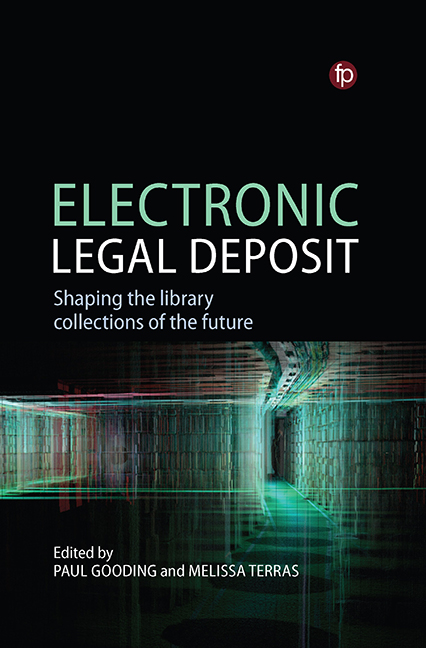Book contents
- Frontmatter
- Dedication
- Contents
- Figures and Tables
- Contributors
- Foreword
- Introduction
- PART 1 INSTITUTIONS AND IMPLEMENTATION
- 1 UK Non-Print Legal Deposit: From Regulations to Review
- 2 The Influence of Legal Deposit Legislation on the Digital Collections of the National Library Of Scotland
- 3 E-legal Deposit at the Biblioteca Nacional de México (National Library of Mexico)
- 4 Bibliographic Control in Zimbabwe: the Conundrum of Legal Deposit in the age of Digital Technologies
- 5 Electronic Legal Deposit in Sweden: the Evolution of Digital Publications and Legislative Systems
- PART 2 USERS AND CONTEXTS
- 6 Publishers, Legal Deposit and the Changing Publishing Environment
- 7 Making History: Digital Preservation and Electronic Legal Deposit in the Second Quarter of the 21st Century
- 8 Giving with one Click, Taking with the Other: Electronic Legal Deposit, Web Archives and Researcher Access
- 9 Follow the Users: Assessing UK non-print Legal Deposit within the Academic Discovery Environment
- 10 ‘An Ark to Save Learning from Deluge’? Reconceptualising Legal Deposit After the Digital Turn
- Index
Foreword
Published online by Cambridge University Press: 07 November 2020
- Frontmatter
- Dedication
- Contents
- Figures and Tables
- Contributors
- Foreword
- Introduction
- PART 1 INSTITUTIONS AND IMPLEMENTATION
- 1 UK Non-Print Legal Deposit: From Regulations to Review
- 2 The Influence of Legal Deposit Legislation on the Digital Collections of the National Library Of Scotland
- 3 E-legal Deposit at the Biblioteca Nacional de México (National Library of Mexico)
- 4 Bibliographic Control in Zimbabwe: the Conundrum of Legal Deposit in the age of Digital Technologies
- 5 Electronic Legal Deposit in Sweden: the Evolution of Digital Publications and Legislative Systems
- PART 2 USERS AND CONTEXTS
- 6 Publishers, Legal Deposit and the Changing Publishing Environment
- 7 Making History: Digital Preservation and Electronic Legal Deposit in the Second Quarter of the 21st Century
- 8 Giving with one Click, Taking with the Other: Electronic Legal Deposit, Web Archives and Researcher Access
- 9 Follow the Users: Assessing UK non-print Legal Deposit within the Academic Discovery Environment
- 10 ‘An Ark to Save Learning from Deluge’? Reconceptualising Legal Deposit After the Digital Turn
- Index
Summary
On the morning of 9 November 2016 I looked out over a Milwaukee ballroom crowded with librarians, archivists, and specialists in digital preservation. Some were pensive. Many were weeping. Others seemed stricken.
My audience had gathered for the first joint conference of the Digital Library Federation (DLF, the US-based non-profit organisation I then directed) with its new partner, the National Digital Stewardship Alliance (NDSA) – a cross-industry group that had recently come under DLF's wing from its place of genesis at the Library of Congress. We were strangers and friends, largely though not exclusively American, united in a community of practice and the common cause of a dedication to the future of libraries, archives, and their holdings and information services in the digital age. But it suddenly felt as if we didn't know what information was, and whether – despite all our efforts, expertise, and the shared infrastructure that our memory institutions represented – its future could be made secure.
The unexpected outcome of the US presidential election, announced in the wee hours the night before, had cast a pall over this professional audience that crossed party lines. How could so many confident, data-driven predictions have been so wrong? What shared social understandings – built from the seeming common landscape of ubiquitous digital information that we had met to manage and survey – had never, in fact, been shared or were even commonly legible at all? And what evidentiary traces of this time would remain, in a political scene of post-truth posturing, the devaluation of expert knowledge, and the willingness of our new authorities – soon to become as evident on federal websites as in press conferences and cable news punditry – to revise and resubmit the historical record?
The weeks and months that followed, for DLF and NDSA members, were filled with action. While the End of Term Web Archive project sprang to its regular work of harvesting US federal domains at moments of presidential transition, reports that Trump administration officials had ordered the removal of information on climate change and animal welfare from the websites of the Environmental Protection Agency and US Department of Agriculture fostered a fear of the widespread deletion of scientific records, and prompted emergency ‘Data Rescue’ download parties. A new DLF Government Records Transparency and Accountability working group was launched.
- Type
- Chapter
- Information
- Electronic Legal DepositShaping the Library Collections of the Future, pp. xix - xxiiPublisher: FacetPrint publication year: 2019



